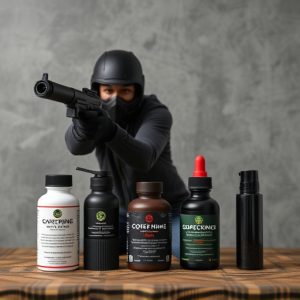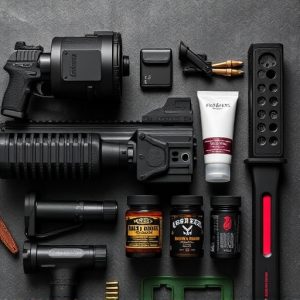Mastering Non-Lethal Defense: Tools & Legalities for Personal Safety
Non-lethal defense tools, including pepper spray, stun guns, alarms, and GPS trackers, offer effecti…….
Non-lethal defense tools, including pepper spray, stun guns, alarms, and GPS trackers, offer effective personal safety in diverse situations. Popular among individuals for self-protection, these products range from easy-to-use devices to app-based solutions, with GPS tracking and automatic alerts. Legal considerations and ethical guidelines govern their use, balancing public safety and individual rights. Responsible users should research reliable products adhering to local laws, ensuring safe and proportional use while protecting themselves without causing harm.
“Explore the world of non-lethal defense—a vital strategy for ensuring safety without resorting to fatal force. In this comprehensive guide, we delve into the various aspects of self-protection, focusing on personal defense products and their role in modern security. From understanding the legal and ethical boundaries of non-lethal forces to choosing the right tools, this article equips readers with knowledge. Discover innovative solutions for your peace of mind, ensuring you’re prepared without compromising ethics or legality. (Keywords: personal defense products)”
Understanding Non-Lethal Defense: A Comprehensive Guide
Non-lethal defense, also known as less-lethal force or alternative force, is a crucial aspect of personal safety that has gained significant attention in recent years. It refers to the use of tools and techniques designed to incapacitate or deter an attacker without causing permanent harm or death. This method is particularly relevant for individuals seeking to protect themselves in various situations, from street muggings to domestic disputes.
In today’s digital era, where awareness about personal safety is on the rise, understanding non-lethal defense options has become essential. A wide range of personal defense products are available, catering to different needs and preferences. From pepper spray and stun guns to personal alarm devices and self-defense keychains, these tools offer effective yet non-fatal means of protection. By investing in such products, individuals can gain confidence in their ability to defend themselves while minimizing the risk of causing severe injury or death.
Personal Defense Products: Options and Considerations
Personal defense products have become increasingly popular as people seek ways to protect themselves in various situations, from everyday urban environments to remote outdoor adventures. These products range from non-lethal weapons like pepper spray and stun guns to personal safety devices such as alarms and GPS trackers. When choosing personal defense products, it’s essential to consider factors like ease of use, legal restrictions, and the specific needs of the user. For instance, pepper spray is a popular option due to its effectiveness in incapacitating an attacker temporarily, but users must understand proper application techniques to ensure safety.
Additionally, technology has introduced innovative personal defense tools. GPS-enabled devices allow individuals to quickly alert emergency services or trusted contacts in case of danger, while app-based solutions offer features like automatic alerts and location sharing. It’s crucial for buyers to research and select products that are reliable, durable, and compliant with local laws. Understanding the legal implications of owning personal defense products is paramount to ensuring a safe and responsible experience.
The Legal and Ethical Framework of Non-Lethal Forces
In many jurisdictions, the legal framework surrounding non-lethal forces and personal defense products is designed to balance public safety with individual rights. Laws vary widely across countries, but generally, they aim to protect citizens from unreasonable use of force by law enforcement and private individuals. Non-lethal weapons, such as pepper spray, stun guns, and tasers, are often legal for personal defense when used in accordance with specific rules and regulations. These products offer a viable alternative to lethal force, enabling individuals to protect themselves without causing permanent harm or loss of life.
The ethical considerations behind non-lethal defense involve respecting human dignity and life while ensuring public security. Advocates argue that these tools empower individuals to defend themselves and reduce the need for deadly force in self-defense situations. However, critics raise concerns about potential misuse, overreach by law enforcement, and the impact on vulnerable populations. As such, ethical guidelines often emphasize proportionality, necessity, and a justifiable reason for using non-lethal force, ensuring that its deployment remains accountable and aligned with societal values.
Choosing the Right Tools for Your Safety and Security
When it comes to your safety and security, selecting the appropriate personal defense products is akin to arming yourself with the right tools for a battle you hope never to face. The market offers an array of non-lethal options, each designed to deter and disable attackers without causing permanent harm. From pepper spray and tasers to stun guns and personal alarm devices, there’s a product suited to various needs and situations.
Choosing the right tool involves considering factors like range, effectiveness, ease of use, and legality in your region. Pepper spray, for instance, provides a safe and legal means of disabling an attacker with temporary blindness and intense irritation. Tasers, on the other hand, deliver a powerful electric shock, rendering an aggressor immobile. Understanding local laws regarding self-defense products is paramount to ensuring you’re prepared without crossing any legal boundaries.


